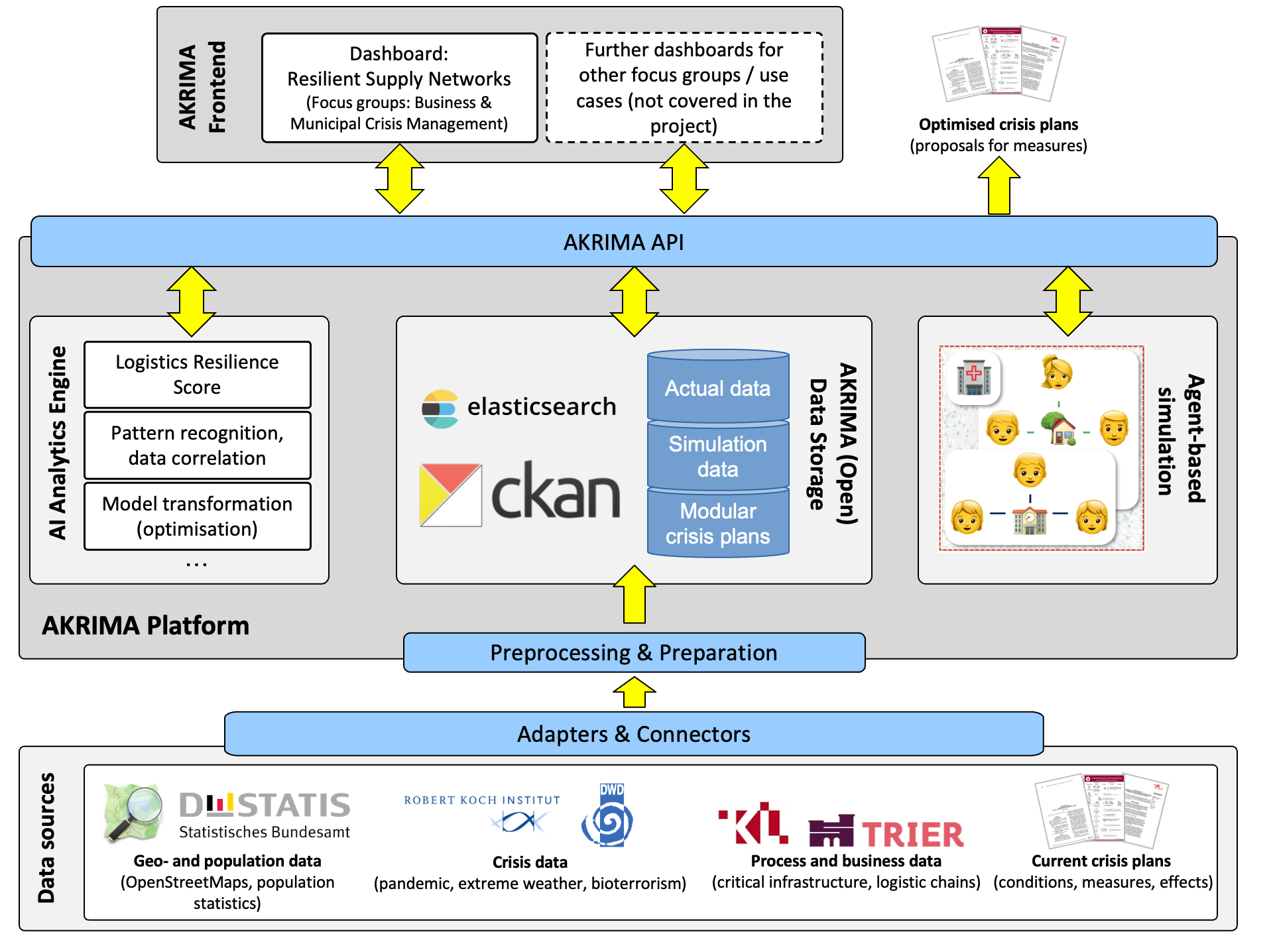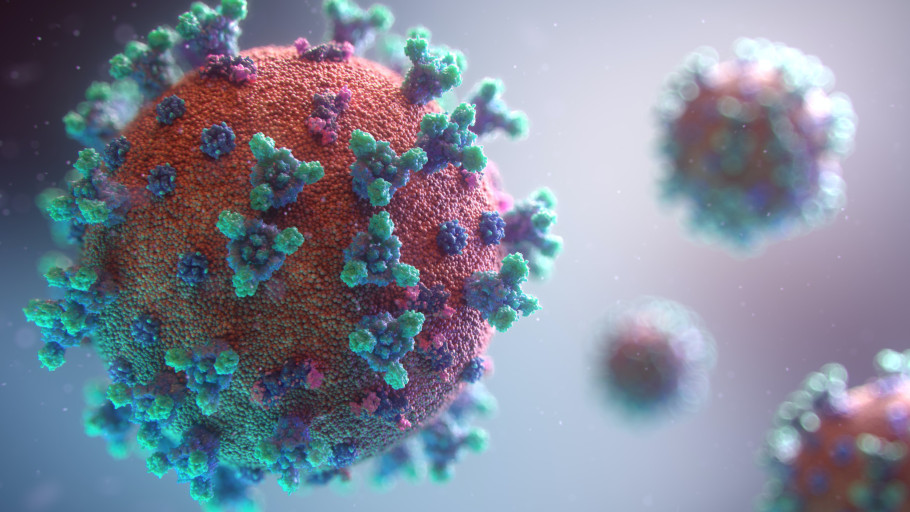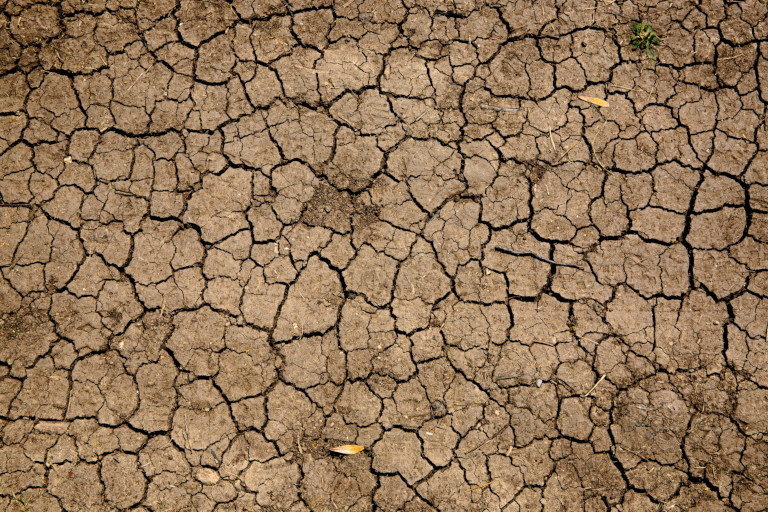
Scientific knowledge can help to successfully manage crises and prepare for future challenges. In a wide range of areas, experience has already been gained in past crises from which new knowledge can be generated. This applies in particular to core topics of civil security, from crisis management to security of supply and risk communication to the simulation of the crisis itself.
The Corona pandemic and recent extreme weather events showed how essential coordinated (corporate) crisis management is. Its cornerstones are flexible, timely and appropriate reactions to changing (crisis) situations. However, the continuous adaptation that is crucial for this represents a considerable challenge for the majority of the actors involved. This is where AKRIMA, the Automatic Adaptive Crisis Monitoring and Management System, comes into play. The AKRIMA project aims to strengthen the crisis resilience of critical infrastructures, logistics chains and authorities and organizations with security tasks through a simulation-based improvement of crisis response mechanisms (KRM). The close cooperation between the various project partners and the target group in practical application is of particular importance. The overall objective of the system is to enable decision-makers to learn from the crisis and previous experiences, in order to improve their ability to act in future crises. For this purpose, extreme crisis scenarios, such as pandemics, heavy rain or drought, are considered using the example of the logistics processes of protective and medical equipment and materials. With AKRIMA, stakeholders can view the information relevant for crisis monitoring and management in a dashboard. The expected consequences of possible courses of action can be examined and evaluated using the AI-based simulation, and the crisis response mechanisms can be optimised to increase resilience. This enables an early response in acute crisis situations and allows to prevent logistics failures as well as supply bottlenecks.
First, a fundamental, novel system model is to be designed and implemented, which can represent the real complexity of modern systems as simply as possible and forms the basis for the early detection of the triggers of cascade effects. Based on this, it is necessary to investigate which parameters can be used to describe and evaluate operational processes in general and during a crisis. In addition, the frame in which the identified process archetypes can be influenced in a crisis and are capable of various resilience-enhancing reactions is to be examined. Subsequently, a key figure model is to be designed, which combines these status parameters and indicators for crisis situations into a Logistics Resilience Score. Based on this, existing crisis reaction mechanisms will be evaluated using AI-based pattern recognition and correlation analyses. These mechanisms are also evaluated by means of agent-based simulation of crisis scenarios and systematic exploration of possible developments using data farming. Based on the data farming, an evolution of the crisis response measures will now take place. The first step is to identify patterns which can lead to undesired effects of crisis response measures or prevent their effectiveness and automatically develop alternative proposals for improvement. Subsequently, the updated measures are to be implemented and their effectiveness documented, so that they can be used as input in the next simulation. Finally, the relevant information is to be presented in a powerful dashboard.


A pandemic refers to a "new", but temporally limited, worldwide strong spread of an infectious disease with high Infection rates of 50% and more and usually also with severe courses of disease (RKI, 2015). Pandemics are caused by bacteria, viruses, parasites or prions, which is usually due to transmission from animals to humans. In this case, the infected person has hardly come into contact with the virus that causes the disease, which is why there is a rapid risk of infection.

Bioterror describes the deliberate use of microorganisms and toxins, generally of microbial, plant or animal origin, to cause disease and death in humans, livestock, and crops (DaSilva, 1999). Currently, circa 200 possible pathogens are known, including bacteria, viruses, fungi, and biological pathogens/toxins, but these are modifiable through biotechnology. Bioterrorist agens are sometimes highly contagious and usually possess durable permanent forms such as "spores." The onset of bioterror occurs suddenly and without warning, making its causes difficult to detect and its effects delayed.

Heavy rainfall occurs when large amounts of precipitation fall in a short period of time. Such events have enormous local damage potential, but are difficult to predict in terms of intensity and location, which means that there are only very short warning times. The resulting effects are widespread and range from damage to or destruction of infrastructure and power supply to contamination of the water by sewage treatment plants or other chemicals and even injuries and fatalities.

Drought is a lack of water brought about by less precipitation and, if necessary, supplementary increased temperatures than usual (dwd). Causes may include several dry years in a row, continuous dry and warm weather since spring or additional heat waves. The effects of this crisis include high fire risk, food and water shortages as well as low water, which can lead to the restriction of inland navigation.
The last few years in particular have shown the vulnerability to crises, with the consequences only becoming apparent when it is already too late. However, through the use of simulation, these consequences can be made visible beforehand, without the need of resources . In addition, it is possible to highlight the level of preparation for a crisis. In order for the already gained experience to help prepare for new crises here, it is necessary to document and make available the existing (practical) knowledge and best practices from all levels of crisis management. In this way, the knowledge from existing processes, procedures and structures can be applied in the simulation. Participation as an associated partner offers the opportunity to be a part of this new research and thus a pioneer in the fields of artificial intelligence and crisis prevention. In this way, not only can one's contribute the own knowledge and experience but also expand the network and shape the future of crisis management. The exchange of experience from business practice and the latest findings from research are just as important for the project as insights into internal crisis management.

Krisen werden zunehmend komplexer, Reaktionen müssen immer schneller und passgenauer werden. In AKRIMA wird ein innovativer, KI- basierter Ansatz für ein (teil-) automatisches, adaptives Krisenmonitoring und -management umgesetzt. Damit sollen Handlungsvorschläge generiert und die richtigen Informationen zur Verfügung gestellt werden, um Lieferketten zu stabilisieren. Sie erwarten ein proof of concept, tiefe Einblicke in den Forschungsprozess und spannende Impulse!